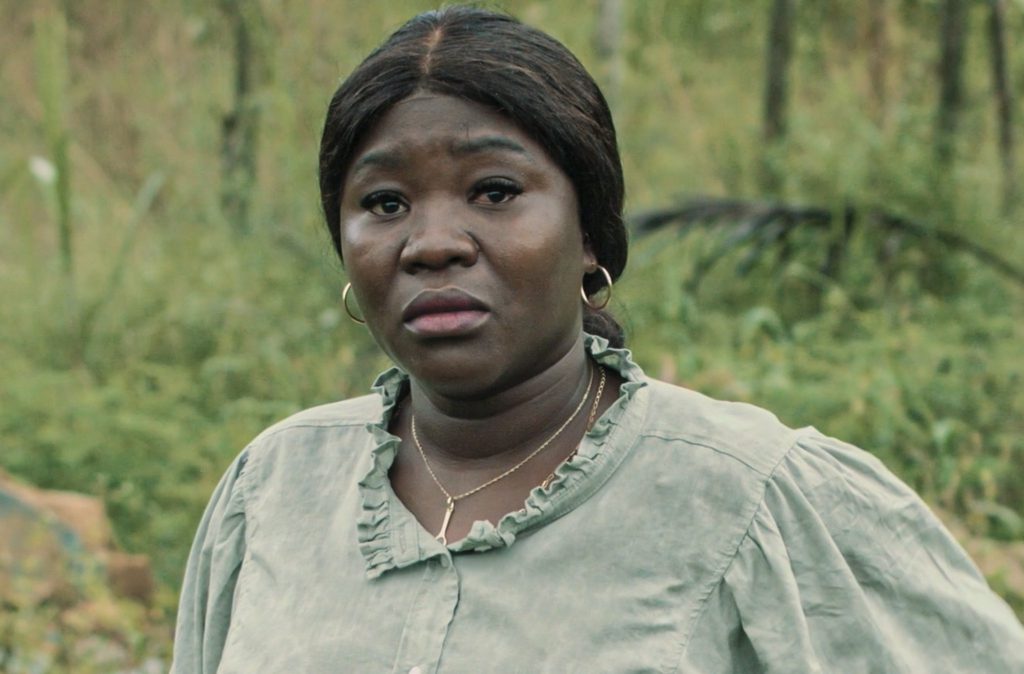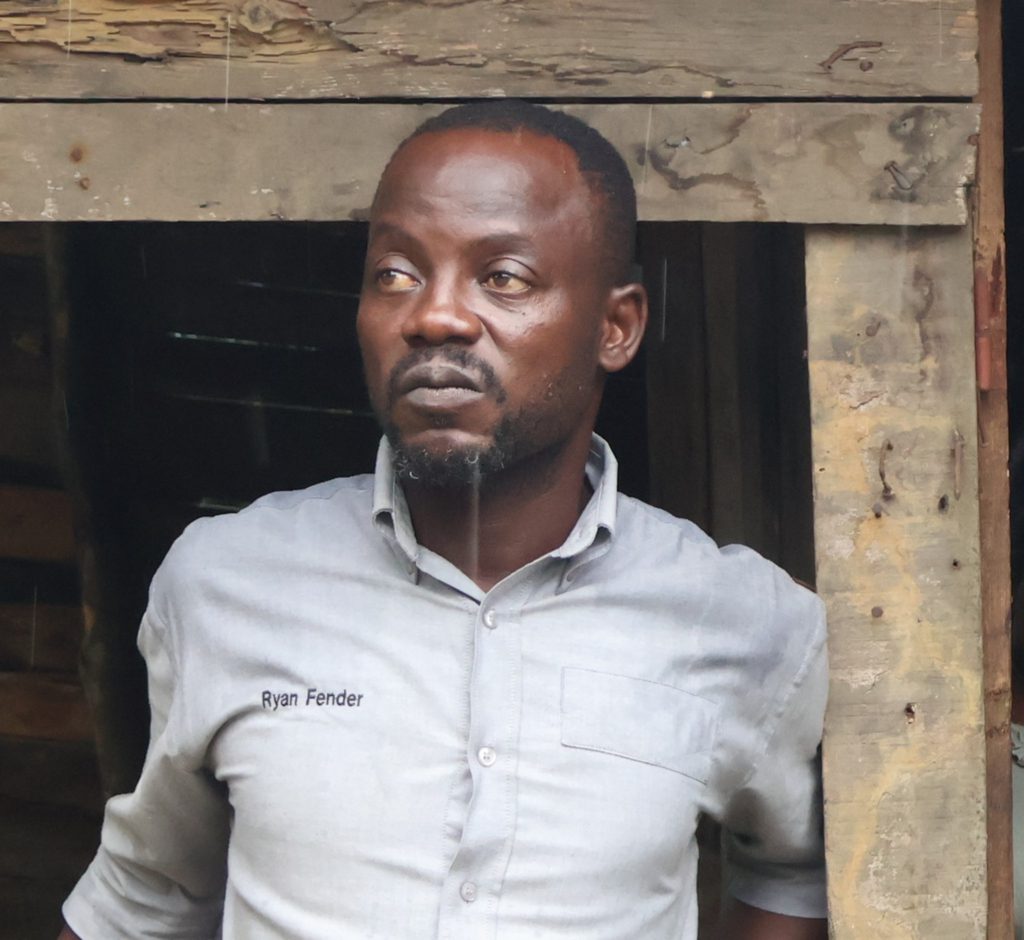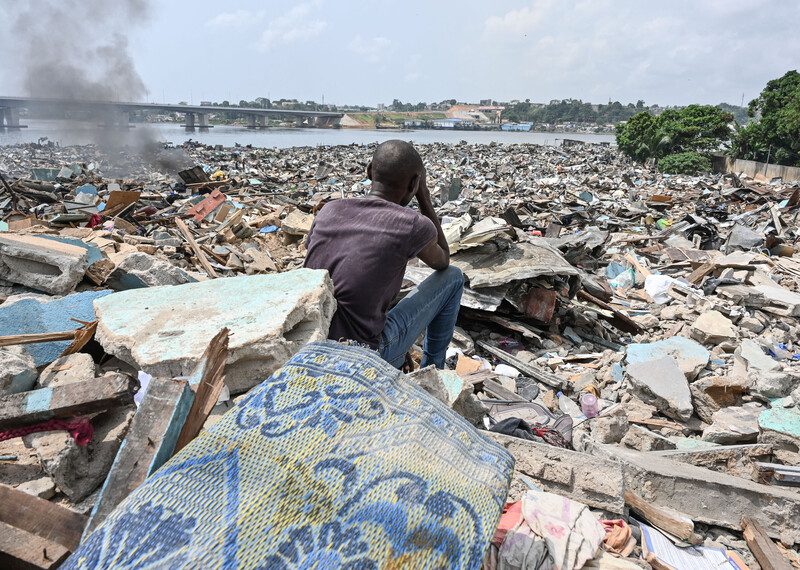In the Gesco neighbourhood of Abidjan, 133 farmers saw their enclosures and fishponds demolished by the authorities on 21 February 2024 without prior adequate notice, as documented by Amnesty International.
A site of almost four hectares had been granted to them in 2011 by a state-owned company for the creation of an agro-pastoral zone. The farmers’ association estimates the losses at around 650,000,000 FCFA — around 1 million euros. As of November 2024, no compensation had been paid, according to the farmers, who deplored the lack of information provided by the authorities.
In Abidjan, demolition and sanitation operations have affected already marginalized people in several neighbourhoods, including workers in the informal sector, in violation of international human rights standards.
On 21 November, the Ivorian authorities announced the suspension of evictions in Abidjan, rehousing solutions and support for income-generating activities, as well as the implementation of support measures announced in March 2024. Amnesty International will follow up on the implementation of these commitments.
Konima Doumbia
38-year-old Konima Doumbia had borrowed a substantial sum to launch her business. Since the demolitions, the entrepreneur has lost everything and is struggling to repay her loan.

“I’m a woman entrepreneur. I’ve been raising livestock and fish for almost three years. My husband supports our family. I wanted to do something for myself, so that I could get by and do what I love. Although I didn’t go to school, I took a training course. I saw other women who hadn’t gone to school either but who were successful, and that was my objective. The business I was running was making money, with eight people working for me. I never imagined that it would end like this.
Where am I going to find the money to pay back my loan?
Konima Doumbia
What traumatizes me is that I borrowed 10 million FCFA [15,000 euros] from a microfinance bank. Since the demolition of my farm, I’m running a small business, selling goods to be able to repay my loan. Any bit of money I earn, I give it to the bank. When you take out a loan and don’t manage to pay it back on time, the interest rates go up and up and up… I am suffering. I haven’t been able to sleep properly since the demolitions.
Had I known they were going to demolish it, I wouldn’t have gone into debt and invested in a void! I had no information about the demolition project. If only they had given us time to sell our animals. The ones who lived on the site said that people came to take measurements, but they didn’t say anything. And then they came to destroy everything. I couldn’t save anything. My husband gives me moral support. He tells me that maybe I will be compensated one day. I haven’t received anything.
I had a small car that I pawned. So, now I walk. If I can’t pay back my loan, they will take the car away for good. I have had to sell some of my jewellery. When I think about this whole situation, I cry. I am experiencing depression. If you have people around you to talk to, it helps, but if you don’t have anyone to talk to, you can go under. Where am I going to find the money to pay back my loan?”
Sophie Baka
Sophie Baka, a 65-year-old widow and mother of two, took up livestock farming in 2017 to prepare for her retirement. She employed two people. Since the demolition of her farm, she has experienced further violations of her human rights.
“After the demolition, someone living in Gesco was kind enough to take me in. I stayed with this person for four months. Then she told me to build a kind of hut on her plot, where there aren’t even any latrines. I’ve been sleeping there for almost five months. It’s a hut, what will happen if it rains a lot?
On 1 September, the same destroyers came back to register us in anticipation of further demolitions. And the very next day, they came to break up part of our site. Maybe they will come back, maybe they won’t. We’re hoping that they won’t come and demolish our houses. They broke my farm. If they now break my hut, where will I be?
A few days before that, on 26 August, the Town Hall convened a working session with the inhabitants. It was the first time since the demolitions. They had called us in to tell us that the demolition work was going to start again. We have to demolish it to beautify the entrance to Abidjan because, according to the mayor, our site is ugly to look at. One of the leaders of our association asked the mayor what was going to happen to us, the farmers of Gesco Rivière. The mayor said that we were akin to the street vendors on the pavements: they were being removed because they hadn’t asked permission to set up. I asked for the microphone to speak, and they didn’t give it to me. At that meeting, I saw that there was a bit of hatred in what they had come to do. Once the meeting was over, I sat in the room staring into space, even though everyone else had already left.
The pigsty and hen houses were a big investment, over 20 million FCFA [30,000 euros] gone up in smoke.
Sophie Baka
We had created small vegetable gardens with the manure, which helped people who had nothing to eat and who passed by. So much harm was done to many people [as a result of the demolition], including them. They may no longer have anything to eat.
Now, I’m getting by selling snails at the market. A fortnight ago, they took our goods during the night. They kind of stole them. A lot of us had left our goods there, covered in loincloths. They have come to cause me another loss. I owe money, about 200,000 FCFA [300 euros], to the woman who gave me the snails on credit. How will I repay her?
I have to keep going. I think a lot at night. The pigsty and hen houses were a big investment, over 20 million FCFA [30,000 euros] gone up in smoke. Breeding was very profitable. I paid my employees, fed myself and looked after myself. I have diabetes. I stopped my medical treatment in February because I have no money. Perhaps God will call me back to him. Or perhaps he will allow me to live.
I used to raise livestock so that one day I could buy myself a little house and live out my last days happily. Now everything is shattered. I’m suffering financially and morally. I could never have imagined this. I don’t want to tell people that I’m suffering.
If only the mayor could say something comforting to us. I tell myself that one day he’ll call us to give us a bit of hope. What I need is consolation.”
Guillaume Ballé Zilé
Guillaume Ballé Zilé, a 43-year-old father of four, is the president of the farmers’ association and used to work as a trainer. A farmer himself, he had invested 14.8 million FCFA [22,700 euros] of his own money into his farm. Unable to pay his rent following the demolitions, he left Abidjan.
“People don’t want to meet with us, they don’t want to acknowledge us. We wrote to the President of the Republic, several ministries and some NGOs… The Ministry of Animal Resources met with us. They asked us to provide documents, which we did, since we have a bailiff’s report of the demolitions. It has been three or four months and, since then, nothing happened. We contacted the Autonomous District of Abidjan, but they won’t even open their door. The mayor of Yopougon said he wouldn’t consider us, that he doesn’t have information on our situation. The International Labour Office has recommended that we contact a trade union to help us file our claims.
Since the demolitions, I have left Abidjan and moved to the countryside to start growing vegetables again. It hasn’t been easy for me. I can’t even afford to buy seeds.

The demolitions came as a shock. I used to rent a house, and my family and I were all living together. After what happened, I couldn’t pay the rent. I sent the children to live with their grandmothers. I have a cousin who’s a teacher, so she made it easier for the children to go to school.
If they could at least respect us and respect our work. When you see all this brutality, you wonder if we are considered
Guillaume Ballé Zilé
as sub-human in this country.
On the site, there were SCB [Société de Culture Bananière – Banana Growing Company] and Sodefor [Société de développement des forêts – Forest Development Company]. They put us at ease, often telling us not to worry, to keep working and investing… There was no written agreement. We asked them for the papers, they told us the site was a classified forest, they showed us a decree. They said, ‘If we have to evict you one day, we will let you know within a reasonable time.’
When it happened, me and my two eldest sons were at the farm. The bulldozer came… I wanted to negotiate that they give us at least five days so that we could evacuate the animals. They asked me if our association was legally constituted. As I went over to show them the official journal one of them pushed me and I fell over. My children saw that, and I was humiliated. I cried a bit. A crowd of people came to steal the animals. They prevented us from filming the scene.
Had they informed us, two or three days before, or even one day prior, we would have evacuated! I sent my children away immediately afterwards, so that they wouldn’t sense that I was traumatized.
I have done a BTS [a two-year, advanced technician’s certificate] in animal breeding and agriculture, so that is what I really wanted to do. If they could at least respect us and respect our work. Because when you see all this brutality, you wonder if we are considered as sub-human in this country. We had managed to curb some of the unemployment, with all the employees we had. They should try to respect our corporation. If we had a [new] site and the financial means to take over, that would be ideal. The most important thing is to be able to work. Even eating has become difficult.”



